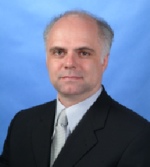Category: Monitoring systems
An old man walks down the stairs in his home. Suddenly, he trips and falls. No one is home to help him. But soon he hears the reassuring clanging of approaching sirens. The surveillance system installed in his home...
Read on »
Posted by Greg Laden at 11:38 AM • 0 Comments • 0 TrackBacks
Category: Digital security
Which is more advanced, the technology used by movie makers to depict security in action, or the technology itself?
Read on »
Posted by Greg Laden at 4:13 PM • 4 Comments • 0 TrackBacks
Sorry Peter, I hope this wasn't a GE device! I love the fact that what makes it work is spitting on it....
Read on »
Posted by Greg Laden at 11:20 AM • 0 Comments • 0 TrackBacks
Category: robots
... well, not exactly, but close: More details here....
Read on »
Posted by Greg Laden at 11:11 AM • 0 Comments • 0 TrackBacks
Category: Fallacies
Can ants save us from worms?
Read on »
Posted by Greg Laden at 11:10 AM • 6 Comments • 0 TrackBacks
Category: Digital security
It is kind of fun watching the new browser war heat up, with Google (a force not to be messed with lightly) lumbers on to the battlefield with Chrome, and Microsoft (a force not to be messed with lightly either)...
Read on »
Posted by Greg Laden at 9:43 AM • 0 Comments • 0 TrackBacks
Category: Data mining
Any new technology is liable to be used for something other than originally intended. That is often a good thing. As I was growing up, I was told that our new digital wrist watches were a side effect of the...
Read on »
Posted by Greg Laden at 11:10 AM • 3 Comments • 0 TrackBacks
Category: Device ID technology
On 9/11 I was in Cincinnati Ohio working on an optical metrology problem for measuring the shape of aircraft engine blades for GE Aircraft engines. That evening we were planning to fly back to Albany NY. However since all commercial...
Read on »
Posted by Peter Tu at 5:07 AM • 1 Comments • 0 TrackBacks
Standards For Identity Credentials And Authentication Systems Described ScienceDaily (Sep. 9, 2009) -- Two publications from the National Institute of Standards and Technology (NIST) describe new capabilities for authentication systems using smart cards or other personal security devices within and...
Read on »
Posted by Greg Laden at 11:11 AM • 0 Comments • 0 TrackBacks
Category: Device ID technology
The cookie is a wonderful thing. I'm not talking about Grandma's "Tule Huuse" recipe for chocolate cookies, but the internet browser thing that most people learn to loathe. Internet cookies give your browser and the sites you visit a special...
Read on »
Posted by Greg Laden at 11:11 AM • 3 Comments • 0 TrackBacks

 Greg Laden is a blogger, writer and independent scholar who occassionally teaches. He has a PhD from Harvard in Archaeology and Biological Anthropology, as well as a Masters Degree in the same subjects. He is a biological anthropologist, but for many years before going to graduate school to study human evolution, he did archaeology in North America. He thinks of himself as a biologist who focuses on humans (past and present) and who uses archaeology as one of the tools of the trade. Greg blogs regularly on ScienceBlogs at http://www.scienceblogs.com/gregladen/.
Greg Laden is a blogger, writer and independent scholar who occassionally teaches. He has a PhD from Harvard in Archaeology and Biological Anthropology, as well as a Masters Degree in the same subjects. He is a biological anthropologist, but for many years before going to graduate school to study human evolution, he did archaeology in North America. He thinks of himself as a biologist who focuses on humans (past and present) and who uses archaeology as one of the tools of the trade. Greg blogs regularly on ScienceBlogs at http://www.scienceblogs.com/gregladen/. Dr. Joseph J. Salvo attended Phillips Andover Academy, received his A.B. degree from Harvard University and his Master and Ph.D. degrees in Molecular Biophysics and Biochemistry from Yale University. Dr. Salvo joined the GE Global Research Center in 1988. His early work focused on the development of genetically modified bacteria and fungus, for the production of novel high performance polymers. In the mid 1990's he turned his group's efforts towards developing large-scale internet-based sensing arrays to manage and oversee
business systems. Most recently, he and his team have developed a number of complex decision engines that deliver customer value through system transparency and knowledge-based computational algorithms. Commercial business implementations of his work are currently active in Europe, and Asia as well as North and South America.
Dr. Joseph J. Salvo attended Phillips Andover Academy, received his A.B. degree from Harvard University and his Master and Ph.D. degrees in Molecular Biophysics and Biochemistry from Yale University. Dr. Salvo joined the GE Global Research Center in 1988. His early work focused on the development of genetically modified bacteria and fungus, for the production of novel high performance polymers. In the mid 1990's he turned his group's efforts towards developing large-scale internet-based sensing arrays to manage and oversee
business systems. Most recently, he and his team have developed a number of complex decision engines that deliver customer value through system transparency and knowledge-based computational algorithms. Commercial business implementations of his work are currently active in Europe, and Asia as well as North and South America. Dr. Peter Tu received his undergraduate degree in Systems Design Engineering from the University of Waterloo, Canada, and his doctorate from Oxford University England.
In 1997, he joined the Visualization and Computer Vision Group at the GE Global Research Center in Niskayuna, NY. He has developed algorithms for the FBI Automatic Fingerprint Identification System. He is the principle investigator for the ReFace program, which has the goal of automatically computing the appearance of a person’s face from skeletal remains. Dr. Tu has also developed a number of algorithms for the precise measurement of specular and high curvature objects. His current focus is the development of intelligent video algorithms for surveillance applications.
Dr. Peter Tu received his undergraduate degree in Systems Design Engineering from the University of Waterloo, Canada, and his doctorate from Oxford University England.
In 1997, he joined the Visualization and Computer Vision Group at the GE Global Research Center in Niskayuna, NY. He has developed algorithms for the FBI Automatic Fingerprint Identification System. He is the principle investigator for the ReFace program, which has the goal of automatically computing the appearance of a person’s face from skeletal remains. Dr. Tu has also developed a number of algorithms for the precise measurement of specular and high curvature objects. His current focus is the development of intelligent video algorithms for surveillance applications.


